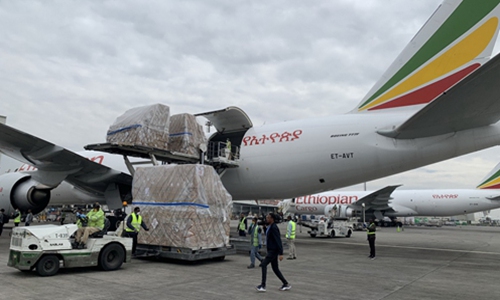Beijing’s two giant airports open for cargo flights by all domestic, foreign airlines
By Tu Lei Source:Global Times Published: 2020/5/13 20:58:41

An Ethiopian Airlines cargo flight filled with medical supplies donated to Africa from the Jack Ma Foundation and Alibaba Foundation arrives in Addis Ababa, Ethiopia, on March 22, 2020. Photo: Xinhua
China's air regulator said on Wednesday that it will open both airports in Beijing for all operators of cargo flights, a move to encourage rising air shipments as the coronavirus outbreak ebbs.China will allow domestic and foreign carriers to operate cargo routes at both Beijing Daxing International Airport and Beijing Capital International Airport, the Civil Aviation Administration of China (CAAC) announced.
In 2018, all airlines except China Postal Airlines were told to choose one of the airports to operate cargo routes.
The regulator said it will further simplify the procedures for permits for international cargo routes. For example, airlines only need to apply for a permit once, and they can operate all international cargo routes in the catalog after gaining approval.
China's international air freight capacity has improved in a short time.
China maintains regular cargo flights to 102 destinations in 49 countries and regions. In April, Chinese and foreign airlines had an average of 1,574 scheduled flights per week, an increase of 133.2 percent from the pre-virus period.
American Airlines currently operates two daily cargo flights from the Hong Kong Special Administrative Region to Los Angeles and two daily cargo flights from Shanghai to Los Angeles, carrying mainly medical supplies and daily necessities.
Starting on Thursday, American Airlines will add three weekly cargo flights from Beijing to Dallas-Fort Worth using a Boeing 787-9.
Lufthansa Cargo China told the Global Times on Wednesday that it resumed scheduled cargo flights between Germany and China from mid-April, and it now has 105 cargo flights per week between Germany and China.
Before the coronavirus epidemic, Lufthansa Cargo had a market share of around 12 percent for cargo shipped between Europe and China, and 25 percent for that shipped between Germany and China.
Airbus also said it is developing a modification for the A330 and A350 family aircraft that will enable airlines to install freight pallets directly onto the cabin floor seat tracks, after removal of the economy-class seats.
This solution will help airlines' operational business continuity, and also alleviate the global shortage of "cargo-hold" air cargo capacity due to the widespread grounding of long-haul aircraft amid the COVID-19 pandemic, the company said.
Posted in: INDUSTRIES,COMPANIES